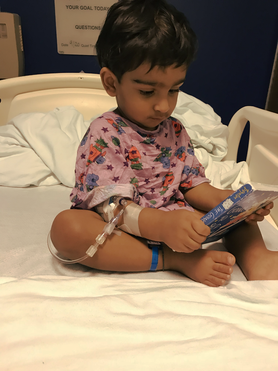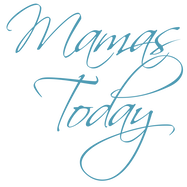Fever Chart
Keeping track of a baby's temperature can be daunting in the beginning. As parents we are always worrying about if our baby is getting sick. Unfortunately, this is something every parent goes through.
A fever in a baby is a rectal reading of 100.4° F (38° C) or more according to the American Academy of Pediatrics. There are many illnesses that can cause a fever (Croup, Flu, infections) but a fever by itself is not an illness. A fever is usually your body's sign that it is trying to fight off an illness, and it's important to keep an eye on your baby's temperature because your baby is not able to tell you what is happening.
A fever in a baby is a rectal reading of 100.4° F (38° C) or more according to the American Academy of Pediatrics. There are many illnesses that can cause a fever (Croup, Flu, infections) but a fever by itself is not an illness. A fever is usually your body's sign that it is trying to fight off an illness, and it's important to keep an eye on your baby's temperature because your baby is not able to tell you what is happening.

If your child is over the age of one, then a fever can fall into one of these ranges:
100 - 102 °F (37.8 - 39 °C) - Low grade Fever
102 - 104 °F (39 - 40 °C) - Average Fever
Over 104 °F (40 °C) - High Fever (call the doctor)
Over 106 °F (41.1 °C) - Very High Fever (go to the hospital)
Over 108 °F (42.3 °C) - Dangerous Fever (call for an ambulance)
If your baby is less than 12 weeks old and he/she develops a fever, please call your doctor immediately. A baby's body at this age is not ready to fight off an infection. If your baby is 3 months - 6 months old, then call your doctor if the baby has a temperature above 101 °F (38 °C).
It is also important to look for other symptoms when a fever is present. Having a fever should not affect a baby's behavior. If the baby or child is having difficulty staying awake, eating and is becoming dehydrated, call your doctor.
Treatment for your baby's fever can vary depending on your baby's age and what is causing the fever. Offer your baby a lot of cold liquids or milk (if breastfeeding give them more breast milk, as it can help your baby fight off the infection). For children, dress them in one layer of light clothing (unless they are shivering) as wearing light clothing helps the heat release from the body. If your baby is less than one, then do not overdress or bundle your baby - it's best to keep your baby in one piece of clothing or just a diaper. Overdressing your baby or child can lead to overheating, which can result in the baby or child having seizures.
If your baby is over 3 months, please consult with your doctor before giving any kind of medication. The most common fever reducing medications are acetaminophen and ibuprofen (DO NOT use aspirin as it can cause a rare but serious brain disease). If your doctor tells you to give medication, it may take 1-2 hours to see any results. If medication does not bring the temperature down, you may need to take your baby to the emergency room for an evaluation.
Most fevers usually last about 2-3 days and can range from 101 - 104 °F (38.4 - 40 °C). Your child should not go back to school until he/she has been fever free for at least 24 hours.
Call your doctor if:
It is important to note that having fevers is a healthy way for your child's body to fight off an infection. It helps your child's immune system develop. Always consult your doctor before giving any medication to your child.
100 - 102 °F (37.8 - 39 °C) - Low grade Fever
102 - 104 °F (39 - 40 °C) - Average Fever
Over 104 °F (40 °C) - High Fever (call the doctor)
Over 106 °F (41.1 °C) - Very High Fever (go to the hospital)
Over 108 °F (42.3 °C) - Dangerous Fever (call for an ambulance)
If your baby is less than 12 weeks old and he/she develops a fever, please call your doctor immediately. A baby's body at this age is not ready to fight off an infection. If your baby is 3 months - 6 months old, then call your doctor if the baby has a temperature above 101 °F (38 °C).
It is also important to look for other symptoms when a fever is present. Having a fever should not affect a baby's behavior. If the baby or child is having difficulty staying awake, eating and is becoming dehydrated, call your doctor.
Treatment for your baby's fever can vary depending on your baby's age and what is causing the fever. Offer your baby a lot of cold liquids or milk (if breastfeeding give them more breast milk, as it can help your baby fight off the infection). For children, dress them in one layer of light clothing (unless they are shivering) as wearing light clothing helps the heat release from the body. If your baby is less than one, then do not overdress or bundle your baby - it's best to keep your baby in one piece of clothing or just a diaper. Overdressing your baby or child can lead to overheating, which can result in the baby or child having seizures.
If your baby is over 3 months, please consult with your doctor before giving any kind of medication. The most common fever reducing medications are acetaminophen and ibuprofen (DO NOT use aspirin as it can cause a rare but serious brain disease). If your doctor tells you to give medication, it may take 1-2 hours to see any results. If medication does not bring the temperature down, you may need to take your baby to the emergency room for an evaluation.
Most fevers usually last about 2-3 days and can range from 101 - 104 °F (38.4 - 40 °C). Your child should not go back to school until he/she has been fever free for at least 24 hours.
Call your doctor if:
- Your child looks or acts sick
- Any serious symptoms occur such as difficulty breathing
- Fever goes above 104 °F (40 °C)
- Any fever occurs in a baby less than 12 weeks old
- Fever lasts more than 2 days in babies less than 2 years old
- Fever lasts more than 3 days
- You think your baby needs to be seen
- If your child becomes worse
It is important to note that having fevers is a healthy way for your child's body to fight off an infection. It helps your child's immune system develop. Always consult your doctor before giving any medication to your child.

